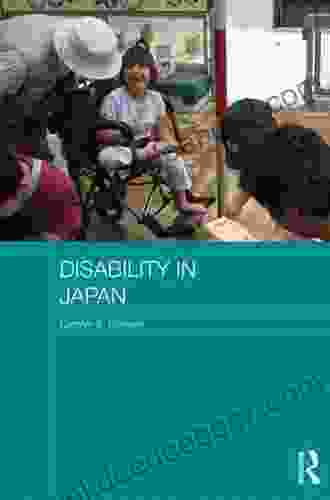Disability in Japan: An Anthropological Perspective

Disability is a complex and multifaceted phenomenon that has been shaped by historical, cultural, social, and economic factors. In Japan, the experience of disability has been influenced by a unique set of circumstances, including the country's long history of isolation, its emphasis on conformity, and its rapidly aging population. As a result, people with disabilities in Japan face a number of challenges, including discrimination, lack of accessibility, and limited opportunities for education, employment, and social inclusion.
5 out of 5
| Language | : | English |
| File size | : | 4178 KB |
| Text-to-Speech | : | Enabled |
| Screen Reader | : | Supported |
| Enhanced typesetting | : | Enabled |
| Word Wise | : | Enabled |
| Print length | : | 192 pages |
This article explores the historical and cultural context of disability in Japan, drawing on anthropological research to provide a nuanced understanding of the experiences and perspectives of people with disabilities in Japanese society. We will examine the ways in which disability has been defined and classified in Japan, the social and cultural factors that shape the experiences of people with disabilities, and the policies and programs that have been developed to support them.
Historical and Cultural Context
The history of disability in Japan can be traced back to the Edo period (1603-1868),when people with disabilities were often seen as a burden on society and were often hidden away from view. This attitude was reinforced by the Confucian emphasis on conformity and the belief that disability was a sign of moral failing. As a result, people with disabilities were often excluded from mainstream society and denied access to education, employment, and other opportunities.
In the Meiji period (1868-1912),Japan began to modernize and Westernize its society. This led to a gradual change in attitudes towards disability, as people with disabilities began to be seen as having potential and value. However, this change was slow and uneven, and people with disabilities continued to face significant discrimination and exclusion.
After World War II, Japan adopted a new constitution that guaranteed the rights of all citizens, regardless of their disability. This led to a number of important changes, including the establishment of a national disability insurance program and the passage of laws prohibiting discrimination against people with disabilities. However, despite these advances, people with disabilities in Japan still face a number of challenges, including discrimination, lack of accessibility, and limited opportunities for education, employment, and social inclusion.
Social and Cultural Factors
The social and cultural factors that shape the experiences of people with disabilities in Japan are complex and multifaceted. Some of the most important factors include:
- The emphasis on conformity: Japanese society places a great emphasis on conformity, and people with disabilities are often seen as being different and outside of the norm. This can lead to discrimination and exclusion.
- The importance of family: The family is very important in Japanese society, and people with disabilities are often expected to be cared for by their families. This can lead to a lack of independence and autonomy for people with disabilities.
- The aging population: Japan has a rapidly aging population, and the number of people with disabilities is expected to increase in the coming years. This will put a strain on the country's social welfare system and make it even more difficult for people with disabilities to get the support they need.
Policies and Programs
The Japanese government has developed a number of policies and programs to support people with disabilities. These include:
- The Disability Insurance Law: This law provides a range of benefits to people with disabilities, including cash benefits, medical care, and vocational rehabilitation.
- The Basic Act for Persons with Disabilities: This law prohibits discrimination against people with disabilities and mandates the provision of reasonable accommodations.
- The Barrier-Free Law: This law requires public buildings and transportation to be accessible to people with disabilities.
These policies and programs have helped to improve the lives of people with disabilities in Japan. However, there is still much more that needs to be done to ensure that people with disabilities have full and equal access to education, employment, and social inclusion.
Disability is a complex and multifaceted phenomenon that is shaped by a variety of historical, cultural, social, and economic factors. In Japan, the experience of disability has been influenced by the country's long history of isolation, its emphasis on conformity, and its rapidly aging population. As a result, people with disabilities in Japan face a number of challenges, including discrimination, lack of accessibility, and limited opportunities for education, employment, and social inclusion.
The Japanese government has developed a number of policies and programs to support people with disabilities. However, there is still much more that needs to be done to ensure that people with disabilities have full and equal access to education, employment, and social inclusion.
Anthropological research can provide a valuable lens for understanding the experiences and perspectives of people with disabilities in Japan. By drawing on anthropological research, we can develop a more nuanced understanding of the challenges and opportunities that people with disabilities face, and we can work to create a more inclusive and equitable society for all.
References
- Asch, A. (1999). Disability and
5 out of 5
| Language | : | English |
| File size | : | 4178 KB |
| Text-to-Speech | : | Enabled |
| Screen Reader | : | Supported |
| Enhanced typesetting | : | Enabled |
| Word Wise | : | Enabled |
| Print length | : | 192 pages |
Do you want to contribute by writing guest posts on this blog?
Please contact us and send us a resume of previous articles that you have written.
 Page
Page Story
Story Library
Library E-book
E-book Magazine
Magazine Paragraph
Paragraph Sentence
Sentence Bookmark
Bookmark Foreword
Foreword Synopsis
Synopsis Footnote
Footnote Manuscript
Manuscript Scroll
Scroll Codex
Codex Tome
Tome Bestseller
Bestseller Classics
Classics Library card
Library card Narrative
Narrative Biography
Biography Autobiography
Autobiography Memoir
Memoir Reference
Reference Encyclopedia
Encyclopedia Dictionary
Dictionary Thesaurus
Thesaurus Narrator
Narrator Character
Character Borrowing
Borrowing Archives
Archives Periodicals
Periodicals Reserve
Reserve Rare Books
Rare Books Special Collections
Special Collections Literacy
Literacy Study Group
Study Group Thesis
Thesis Awards
Awards Theory
Theory Textbooks
Textbooks Leo Black
Leo Black Solae Dehvine
Solae Dehvine Nick Robertson Brown
Nick Robertson Brown Ian Shapiro
Ian Shapiro Jisha Menon
Jisha Menon Charles Bukowski
Charles Bukowski John Forester
John Forester Sonovia Alexander
Sonovia Alexander Linda E Brubaker
Linda E Brubaker Matthew Dobbins
Matthew Dobbins Donald Hall
Donald Hall R H S Stolfi
R H S Stolfi Max Anderson
Max Anderson Nancy Morse
Nancy Morse Course Hero
Course Hero Thich Nhat Hanh
Thich Nhat Hanh Jonathan S Marion
Jonathan S Marion Jeremy Burfoot
Jeremy Burfoot Tom Morton Smith
Tom Morton Smith David Stewart White
David Stewart White
Light bulbAdvertise smarter! Our strategic ad space ensures maximum exposure. Reserve your spot today!

 Hector BlairThe Ultimate Guide to Guitar Strings Cross Stitch Patterns: A Journey Through...
Hector BlairThe Ultimate Guide to Guitar Strings Cross Stitch Patterns: A Journey Through... Jerry HayesFollow ·4.6k
Jerry HayesFollow ·4.6k Elmer PowellFollow ·4.8k
Elmer PowellFollow ·4.8k Richard AdamsFollow ·13.6k
Richard AdamsFollow ·13.6k Gabriel HayesFollow ·18.2k
Gabriel HayesFollow ·18.2k Will WardFollow ·17.2k
Will WardFollow ·17.2k Ian McEwanFollow ·17.5k
Ian McEwanFollow ·17.5k Pat MitchellFollow ·7.4k
Pat MitchellFollow ·7.4k Mario BenedettiFollow ·2.9k
Mario BenedettiFollow ·2.9k

 Bryce Foster
Bryce FosterPerforming Asian American Women On Screen And Scene
The representation of Asian American women...

 Frank Mitchell
Frank MitchellGirl Can Draw: A Spirited and Inspiring Play by Joe...
Prologue In the realm of...

 Marc Foster
Marc FosterThe Epic Story of Race and the American Media: A Journey...
From the Shadows of Slavery to the Dawn of...

 Demetrius Carter
Demetrius CarterThe Ultimate Guide to Hiking West Virginia: Discover the...
West Virginia, often referred to as...

 Isaiah Price
Isaiah PriceThe Ten Step Guide on How to Become Famous: Unleash Your...
In the captivating world of entertainment...
5 out of 5
| Language | : | English |
| File size | : | 4178 KB |
| Text-to-Speech | : | Enabled |
| Screen Reader | : | Supported |
| Enhanced typesetting | : | Enabled |
| Word Wise | : | Enabled |
| Print length | : | 192 pages |










